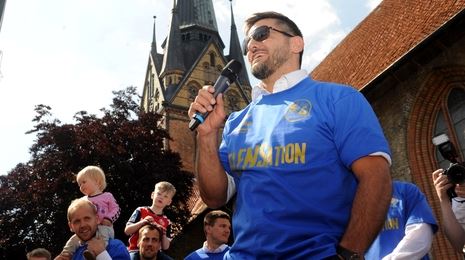

Two neighbours, two trophies, two parties
Two neighbours, two trophies, two parties
It is a handball game that excites the masses just like Barcelona vs Madrid, Man City vs Man United and Schalke vs Dortmund do in football.
Whenever SG Flensburg-Handewitt face THW Kiel an entire region is thrilled. Twice it has been the fixture for an EHF Champions League Final. While Kiel took the trophy in 2007 when there were still home and away matches being played, Flensburg stroke back in 2014 at the VELUX EHF FINAL4.
Four times in the first 13 years of the EHF Champions League both finalists came from the same country; an all-Spanish affair on all four occasions. In 1996 Barcelona won against Elgorriaga Bidasoa; in 2001 Portland San Antonio beat Barcelona; in 2005 Barcelona beat Ciudad Real and in 2006 Ciudad Real beat San Antonio.
Until May 2007 only three German teams had made it to final: Kiel in 2000, Magdeburg in 2002 and Flensburg in 2004 – and only Magdeburg had eventually won the trophy.
A clash everyone remembers
Then came the 2007 final and never before had there been such a small distance between the two competitors: Only 60 kilometres separate Kiel and Flensburg.
In Kiel, fans were camping overnight in front of the ticket office and the same happened in Flensburg. The games sold-out within hours and an entire region went handball-crazy.
Kiel were the clear favourites, but they had been hit hard by a long series of injuries: Lövgren, Ahlm and some more key players were ruled out for the finals.
They reacted and igned legendary Andrej Xepkin from Barcelona, who had quit playing handball after winning the Champions League six times with the Spanish side – and to date he remains the only player with seven trophies to his name.
With only seven court players on the squad list, Kiel travelled to Flensburg. The first leg turned into a private duel between two of the best handball players: While Kiel’s top star Nikola Karabatic netted eight times, Lars Christiansen became top scorer with nine goals – in the end, the result was even: 28:28.
Six days later the decision came at the Ostseehalle in Kiel where 10,250 fans eagerly awaited the start of the clash. It was a fierce battle in which Flensburg’s fans were shocked by an early red card ot Joachim Boldsen, but also Kiel were hit by a red card to Christian Zeitz.
Eventually a French duo decided the match: Karabaticscored nine times to become top scorer of the 2006/07 Champions League season and goalkeeper Thierry Omeyer stood like a wall between the posts. For him, just like for Karabatic, it was the second trophy after they had won the competition in 2003 edition with Montpellier.
“Already the starting whistle, but even more the winners’ ceremony sent shivers down my spine, this was one of the biggest highlights of my career, due to the atmosphere and of course the clash with Flensburg,” said Karabatic.
A long wait – worth every second
While THW Kiel won two more Champions League trophies in 2010 and 2012 at the VELUX EHF FINAL4 in Cologne, Flensburg took the Cup Winners’ Cup in 2012.
Several times both sides met in EHF Champions League group matches, but Flensburg’s wait for a true revenge took seven years.
“We have nothing to lose, we are the underdogs,” said coach Ljubomir Vranjes when in 2014 his team qualified for the first time for the VELUX EHF FINAL4.
He had been a player in that thrilling 2007 final against Kiel, the “last survivor” together with Anders Eggert.
Flensburg faced FC Barcelona in the semi – and they were trailing by six eight minutes before the end.
But mastermind Vranjes brought on his young guns, goalkeeper Mattias Andersson shut his shop and Flensburg managed to make the game to extra time and eventually to penalties.
When young Swede Hampus Wanne scored the decisive goal, Flensburg had reached the final against Kiel – and once more they entered it as the underdogs.
History repeated itself: Flensburg were down by six goals, but never gave up. It was “magician” Andersson who was the key for the biggest ever success in the club’s history. The players threw Vranjes up in the air after winning their first ever EHF Champions League trophy.
“I still have a constant grin on my face, when I think about this weekend. Those are memories nobody can take away from me for the rest of my life. I can be happy with what we earned until the day I die. Those pictures really sent shivers down my spine,” says Vranjes.
On the other hand, Kiel lost their fourth EHF Champions League final in history – but for the first time not against a Spanish team like in 2000 (Barcelona), 2008 and 2009 (both Ciudad Real), but against their neighbours.
And the hardest part of their journey back home was the flight from Cologne to Hamburg – as the biggest punishment for the THW players was to sit in the same plane as the celebrating Flensburg players and their trophy.






